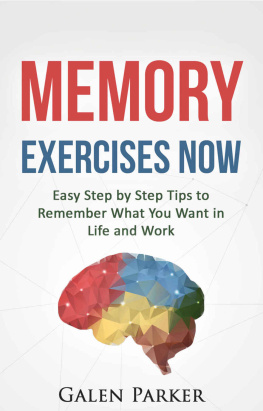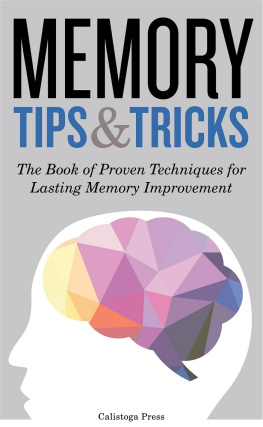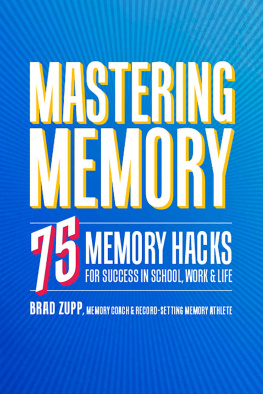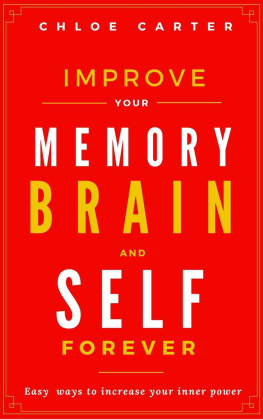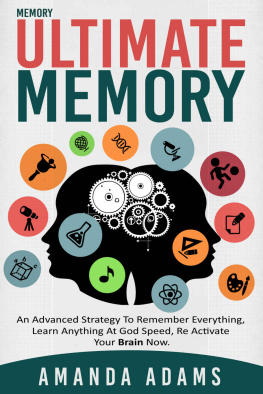Introduction
What is this book about?
First of all, thank you for purchasing this eBook and let uscongratulate you on your decision to improve your memory!
The aim of this book is to provide an actionable and easy tofollow step-by-step guide on improving your memory and remembering things moreeasily, without needing to constantly check your agenda or phone.
Heres what to expect from MemoryExercises Now :
- Finding out how memory works and why we forget things. This book gives you an insight into how we can leapfrog these forgetful issues through the systems suggested and have a more fulfilling day.
- Useful and easy to implement tips on boosting your memory. Well display some general principles on how to improve memory now, draw readers attention on those bad habits that restrict your memory growth, speak about successful memory improvement systems and suggest a simple 7-step guide on improving memory.
- Discovering how this guide will change your everyday life and help you become more effective in work and at school.
- Getting exposed to fun memory exercises that only needs 10 minutes of your time to maintain and improve your memory capacity.
Keep reading to find out the benefits of improving yourmemory!
What are the benefits of learning this?
Why would you want to improve your memory?
Why do you need this and who has time to exercise theirmemory, after all?
Its understandable if you are not very optimistic orinterested in memory improvement challenges, considering all the help we getfrom modern devices or the trivial paper and pencil method of keeping track ofthings.
We suggest this imagination exercise: what would life be likeif you didnt have access to computers, smartphones, tablets, and not even towriting tools? Besides, who didnt go shopping, forgot their carefully craftedlist at home and felt frustrated afterwards not knowing what items to pick?
Before writing was invented, people needed to store andtransmit knowledge using their memory, so people exercised their brain orcertain parts of it more often. Our suggestion is not going back to ancienttimes though, but trying to discover the benefits of putting your memory atwork.
Nowadays, we have become dependent on devices that help usremember things and organise our life and we consider this a normal thing. Ofcourse, we are efficient in what we do and we are happy about it, but is thisthe best way to go?
When a muscle is not exercised, it begins to atrophy, and thesame thing happens with memory. The less we exercise it, the smaller ourcapacity of remembering things becomes. Moreover, playing memory games or doingmemory exercises has been shown to provide the following benefits:
- Avoiding unpleasant situations like misplacing your keys (and no app can help you with that!)
- Improving your ability to concentrate and consequently becoming more productive
- Improving your problem solving and reasoning abilities
- Improving your self-confidence through better cognitive capacity
- Preventing memory-related illnesses at older ages by keeping your brain active all the time
Are you ready to start your memory exercises now and rememberwhat you want in life and work?
Enjoy this fresh start!
Chapter 1:Finding Out More
- How memory works

Memory is the process of encoding, storing and reproducinginformation; without it, we would not be able to learn, adapt to thesurrounding world, and develop a sense of self.
Memory is not a thing we can touch or some type of hard drivewhere we store information like computers do, but rather the process ofremembering things. Memory is not located in a specific part of our brain, butit engages the entire brain and is more complex than scientists used to think.Multiple systems work together so you can remember where youve parked your caror what you had for breakfast this morning. Although the mental experiencescomposing a memory are different and are created by different parts of thebrain, remembering feels like a unitary process and can hardly bedifferentiated from thinking.
Nevertheless, memory can be broken down in three stages:
1) Encoding the information originating from the outside world is perceived by oursense organs in the form of physical and chemical stimuli. Sense organs convertsensations to information and send it to our brain. The brain filters theinformation that is worth encoding.
2) Storage information is maintained in our brains for certain periods of time. Memoriesare stored in the sensory stage, for short terms, or for long periods of time.Our brain uses a filter once again, because not all information is worthstoring.
3) Retrieval the information which was stored at an unconscious level is brought by yourown will into your conscious mind. Successful retrieval depends on howeffectively you have saved information in your memory.
- Memory types and stages
There are different types of memory which can be classifiedafter three different criteria: memory length, information type and temporaldirection.
Classification by memory length:
a) Sensorymemory every memory starts with the sensory stage, where information isretained less than one second after a stimulus is perceived. For instance,after seeing an unknown person on the street, you can remember what he or shelooked like for a split second, without any conscious effort. This is whysometimes you feel like you see more than you can report on the other hand,the effort of storing all the information it comes into contact with would beoverwhelming for our mind and in fact, impossible.

